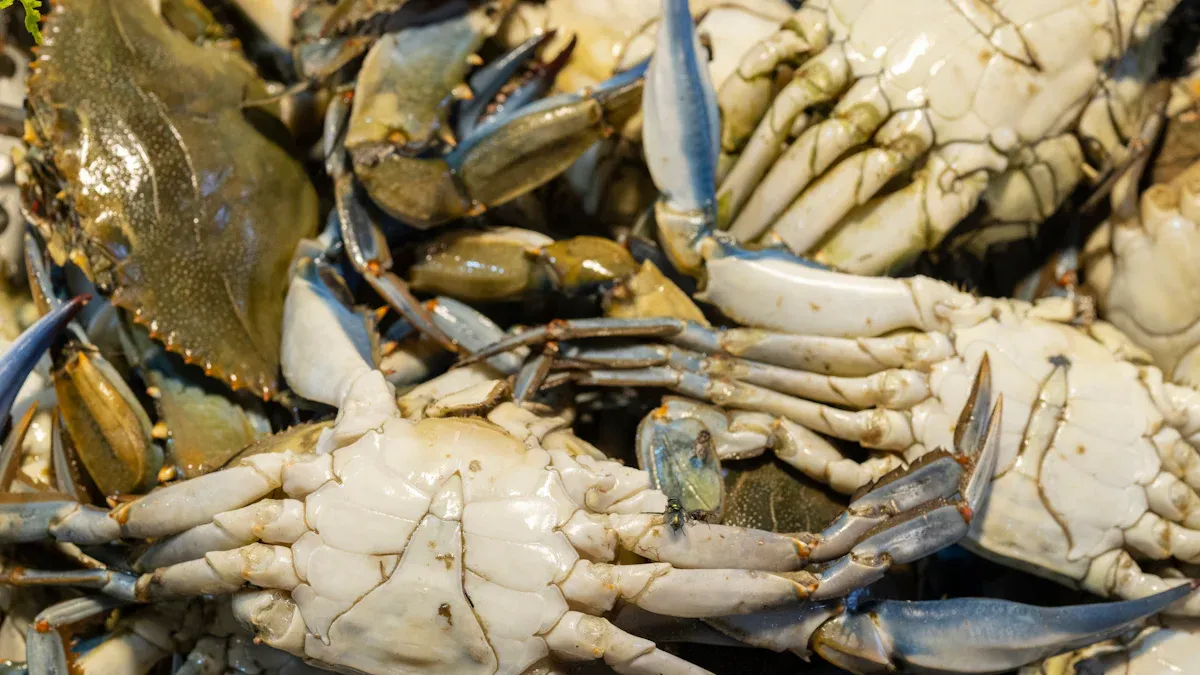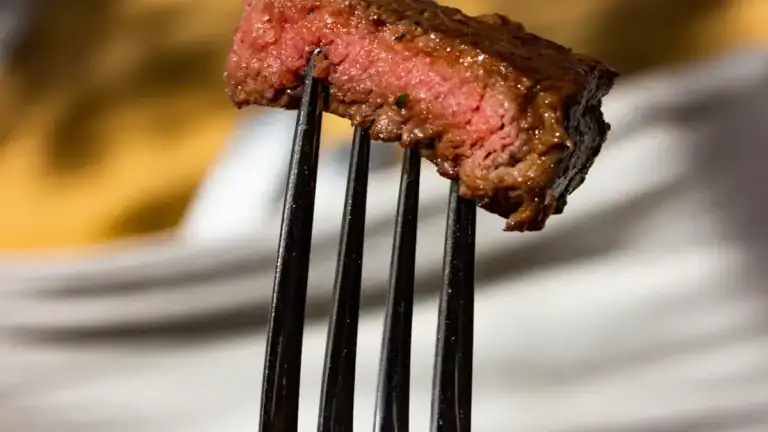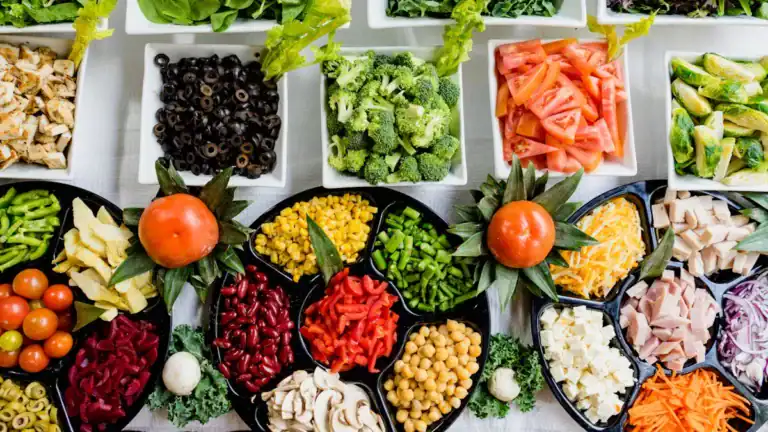
Crab packs a punch with protein, omega-3s, and key nutrients like vitamin B12, selenium, and zinc. You get support for your blood, immune system, and nerves every time you enjoy it. These health benefits can help you feel your best and make crab a smart choice for your plate.
Key Takeaways
Crab is a low-calorie, high-protein food that supports muscle growth and keeps you full without excess fat.
Eating crab boosts your immune system with essential nutrients like selenium and zinc, helping you fight off illness.
Crab provides omega-3 fatty acids, which promote heart health and improve brain function, making it a smart addition to your diet.
Crab Health Benefits

Nutritional Profile
Crab brings a lot to your plate. You get a mix of protein, vitamins, and minerals that help your body stay strong. Take a look at how crab compares to lobster:
Nutrient | Crab (per 3 oz) | Lobster (per 3 oz) |
|---|---|---|
Calories | 70 | 121 |
Protein (g) | 15 | 20 |
Omega-3 (g) | Lower | Higher |
Vitamin B12 | High | Moderate |
Vitamin A | High | Moderate |
Cholesterol | Lower | Higher |
You can see that crab is lower in calories and cholesterol. It also gives you a good amount of vitamin B12 and vitamin A. These nutrients support your energy and help your body work well every day.
Lean Protein
You need protein to build and repair muscles. Crab is a great source of lean protein. Each serving gives you about 15 grams of protein with fewer calories than many other meats. This makes crab a smart choice if you want to stay full and support muscle growth without eating too much fat. Many people choose crab for its health benefits and light, satisfying taste.
Essential Minerals
Crab is packed with minerals your body needs. Here are some of the most important ones you get from crab:
Iron
Zinc
Magnesium
Phosphorus
Potassium
Calcium
Copper
These minerals help your bones, boost your immune system, and keep your heart healthy. When you eat crab, you give your body the tools it needs to stay strong and healthy. The health benefits of crab come from this rich mix of nutrients, setting the stage for even more reasons to enjoy it.
Heart Health
Omega-3s
You might wonder how crab helps your heart. Crab meat gives you omega-3 fatty acids, which are good fats. These fats help balance cholesterol and lower inflammation in your body. When you eat crab, you support your heart and may lower your blood pressure. This can help prevent problems like atherosclerosis, which is when your arteries get blocked.
Let’s see how crab compares to other seafood for omega-3s:
Type of Seafood | Omega-3 (grams per 100g) |
|---|---|
Crab, Alaska king | 0.4 |
Crab, blue | 0.4 |
Crab, Dungeness | 0.3 |
Salmon, Atlantic | 0.9 – 1.5 |
Salmon, Chinook | 0.9 – 1.5 |
Tuna, bluefin | 1.6 |
Crab has less omega-3 than salmon or tuna, but it still gives you a boost. You can add crab to your meals for variety and enjoy the health benefits it brings.
Circulation
Your heart needs healthy blood flow to work well. Crab helps with this, too. Here’s how:
Crab-flavored seafood may help your muscles grow and improve markers linked to heart disease.
Dried crab-flavored seafood contains omega-3 and omega-6 fatty acids, which support your heart.
Crab is rich in omega-3 and zinc, which help control cholesterol.
The American Heart Association suggests eating seafood two to three times a week to keep your blood pressure in check and lower your risk of heart attack.
You can make crab part of your routine and give your heart the support it needs.
Immune Support
Your immune system works hard every day to keep you healthy. Crab can give your body a boost, thanks to its rich supply of selenium and zinc. These nutrients help your body fight off germs and recover faster when you get sick.
Selenium
Selenium is a powerful mineral you get from crab. It acts as an antioxidant, which means it helps protect your cells from damage. When you eat crab, you give your body more selenium, and that can make your immune system stronger. Here’s how selenium from crab can help:
Parameter | 0 mg/kg | 1.5 mg/kg | 3.0 mg/kg |
|---|---|---|---|
Weight Gain Rate (WGR) | Baseline | Highest | Decreased |
Specific Growth Rate (SGR) | Baseline | Highest | Decreased |
Survival Rate (SR) | Baseline | Highest | Decreased |
Immune Enzyme Activity (GPX) | Baseline | Increased | Decreased |
Antimicrobial Peptide mRNA | Baseline | Highest | Decreased |
Intestinal Health | Baseline | Improved | N/A |
You can see that the right amount of selenium improves growth, boosts immune enzymes, and helps your body fight off harmful bacteria. Selenium also helps your body handle stress and keeps your cells safe from damage.
Selenium acts as an antioxidant and reduces oxidative stress.
It is part of glutathione peroxidase (GPx), which protects your cells.
Eating crab gives you selenium, which supports your immune system and helps you stay healthy.
Zinc
Zinc is another important mineral you get from crab. Your body needs zinc to help immune cells work well. Zinc helps you heal faster and fight off infections. When you eat crab, you give your body a natural source of zinc. This supports your immune system and helps you recover quickly from cuts or colds.
Crab stands out as a tasty way to get these nutrients. When you add crab to your meals, you enjoy the health benefits and help your body stay strong all year long.
Bone Strength
Strong bones help you stay active and healthy. When you eat crab, you give your body important minerals that support bone strength. Crab is a great choice if you want to keep your bones in top shape as you grow.
Calcium
You might know that calcium keeps your bones and teeth strong. Crab is a surprising source of this mineral. Check out how much calcium you get from different types of crab:
Fattening male mud crabs: about 1199.71 mg per 100g
Fattening female mud crabs: about 903.2 mg per 100g
Wild male mud crabs: around 760.75 mg per 100g
Wild female mud crabs: about 702.09 mg per 100g
Calcium helps your bones stay rigid and supports many body processes
When you add crab to your meals, you help your body build and maintain strong bones. You also support your muscles and nerves.
Phosphorus
Phosphorus works with calcium to keep your bones and teeth healthy. This mineral is the second most common in your body. About 85% of your phosphorus lives in your bones and teeth. Phosphorus helps form the bone matrix, which gives your skeleton its structure. Crab meat gives you a good amount of phosphorus, so you can keep your bones strong as you grow. You also get magnesium and high-quality protein from crab, which help maintain bone density. Eating crab regularly can make a real difference for your bone health. 🦀
Brain Function
Cognitive Support
You want your brain to stay sharp, right? Crab can help you with that. When you eat crab, you get omega-3 fatty acids, especially DHA. DHA is a superstar for your brain. It helps your mind work better and keeps your memory strong. Clinical studies show that seafood, including crab, gives you the DHA your brain needs for top performance. If you eat seafood like crab once a week, you may notice less decline in memory and faster thinking over time.
Here’s what makes crab a smart choice for your brain:
Omega-3 fatty acids in crab support neurocognitive development.
DHA from crab helps your brain cells communicate.
Regular seafood meals may protect you from age-related memory loss.
You can enjoy crab and know you’re giving your brain a boost. It’s not just tasty—it’s brain food!
Mental Clarity
Have you ever felt foggy or struggled to focus? Crab might help clear things up. The omega-3s in crab support neurotransmitters like serotonin and dopamine. These chemicals help you feel calm and focused. Eating crab can improve your mood and help you think clearly.
Let’s look at how crab supports mental clarity:
Crab meat is linked to better cognitive performance.
Omega-3s in crab help regulate your mood.
Long-chain omega-3s may reduce symptoms of depression and anxiety.
Tip: Try adding crab to your meals when you need to concentrate or feel your best. Your brain will thank you! 🦀
Eating crab is a simple way to support your mind and keep your thoughts clear. You get great taste and great benefits in every bite.
Eye Health
Vision Support
You might not think about your eyes when you eat crab, but this seafood can help support your vision. Crab gives you nutrients that play a role in keeping your eyes healthy. Omega-3 fatty acids stand out as one of the most important nutrients for your eyes. These healthy fats are found in high concentrations in the retina. Your eyes need omega-3s to work well and stay sharp.
A diet rich in omega-3s, especially from seafood like crab, links to a lower risk of age-related macular degeneration (AMD). The Age-Related Eye Disease Study (AREDS) shows that omega-3s help protect your eyes from advanced AMD. If you want to keep your vision strong as you age, adding crab to your meals is a smart move.
Zinc is another nutrient you get from crab. You need zinc for healthy eyes, but crab gives you only about 4 mg per 100 grams. That’s much less than the 80 mg recommended in AREDS vitamins for strong protection against AMD. Studies show that eating crab and oysters does not give enough zinc to lower your risk of advanced AMD. The average zinc intake from these foods is only 1.9 mg per day, which is not enough for the best results.
Tip: You can pair crab with other foods high in zinc or take a supplement if you want extra support for your eyes. 🦀👀
Omega-3s in crab help keep your retina healthy.
Zinc supports your vision, but you may need more than crab alone provides.
Eating crab gives your eyes a boost, but you should look for other sources of zinc to get the full benefits for your vision.
Muscle Growth

Muscle Repair
You want strong muscles, right? Crab can help you reach your goals. When you eat crab, you give your body high-quality protein. Your muscles need this protein to grow and stay healthy. After a workout, your muscles break down. They need building blocks to repair and get stronger. Crab gives you those building blocks.
Crab also contains omega-3 fatty acids. These healthy fats help your muscles recover faster. You might notice less soreness after exercise when you include crab in your meals. Omega-3s can lower inflammation, so your body feels better and bounces back quickly.
Here’s why crab stands out for muscle repair:
You get lean protein that helps rebuild muscle fibers.
Omega-3s support faster recovery and less muscle soreness.
Crab is easy to digest, so your body uses the nutrients right away.
Tip: Try eating crab after a workout. You may feel stronger and recover faster!
Athletes and active people often choose seafood like crab. It boosts overall health and helps you perform better. You don’t have to be a pro athlete to enjoy these benefits. If you want to build muscle or stay active, crab is a smart choice for your plate. 🦀
Eating crab gives your body what it needs to repair, grow, and stay strong. You get great taste and great results every time you dig in.
Weight Management
Low-Calorie Option
Trying to manage your weight? Crab makes it easier. You get a tasty meal that fills you up without loading you with calories. Crab is a smart pick if you want to enjoy seafood and still watch your calorie intake.
Crab sticks, for example, are known as a low-calorie food. You can eat a 100-gram serving and only take in about 95 calories. If you go for a typical serving size—around 3 ounces or 85 grams—you get just 81 calories. That means you can enjoy a satisfying portion without worrying about going over your daily limit.
Let’s see how crab compares to other foods:
Nutrient | Value per 100g |
|---|---|
Calories | 97 kcal |
Protein | 19 g |
Fats | 1.5 g |
Cholesterol | 53 mg |
Iron | 0.76 mg |
You get a lot of protein for very few calories. Crab has 2.1 times more calories than an orange, but it gives you 6.9 times more protein than broccoli. It also has 21.6 times less fat than cheese and 7 times less cholesterol than an egg. If you compare it to broiled beef, crab has 3.4 times less iron, but it’s much lighter on your stomach.
Tip: If you want to feel full and stay on track with your goals, try adding crab to salads, wraps, or even as a snack. 🦀
Crab helps you enjoy delicious meals while keeping your calorie count low. You can eat well and still reach your weight goals!
Anti-Inflammatory Effects
Arthritis Relief
You might not think of crab as a food that helps with joint pain, but it can make a real difference. Crab contains special compounds that fight inflammation in your body. The shell extract of the Nile crab, for example, is packed with unsaturated fatty acids, phenolic acids, and flavonoids. These include benzoic acid, syringic acid, ferulic acid, kampferol, quercetin, and naringin. These natural compounds work together to lower the levels of pro-inflammatory cytokines. They also boost your body’s antioxidant power, which helps protect your joints from damage.
If you deal with arthritis, you know how important it is to keep inflammation down. Crab shells are a natural source of glucosamine, a compound often used to help with joint pain and stiffness. Glucosamine may improve your symptoms and even slow down joint narrowing in osteoarthritis. Take a look at how different types of glucosamine compare:
Type of Glucosamine | Source | Potential Benefits for Arthritis Symptoms |
|---|---|---|
Glucosamine Hydrochloride | Crab shells | May improve symptoms and slow joint narrowing in osteoarthritis. |
Glucosamine Sulfate | Shrimp shells | Similar benefits as above, often used in supplements. |
Synthetic Glucosamine | N/A | Used as an alternative to natural sources. |
Tip: If you want to support your joints, try adding crab to your meals. You get a tasty dish and a boost for your joint health at the same time! 🦀
Crab offers more than just flavor. It gives your body tools to fight inflammation and keep you moving with less pain.
Detoxification
Antioxidants
You might not realize it, but crab helps your body clean itself from the inside out. When you eat crab, you get a boost of antioxidants. These special nutrients protect your cells and help your body get rid of harmful substances. Antioxidants fight free radicals, which are unstable molecules that can damage your cells and make you feel tired or sick.
Crab contains several powerful antioxidants. Take a look at what you get and how each one helps your body:
Antioxidant | Role in Detoxification |
|---|---|
Astaxanthin | Neutralizes harmful free radicals, enhances immune response, and regulates autophagy for optimal cell function. |
SOD (Superoxide Dismutase) | Enzymatic antioxidant that helps in detoxifying superoxide radicals. |
CAT (Catalase) | Enzymatic antioxidant that converts hydrogen peroxide into water and oxygen, reducing oxidative stress. |
GPX (Glutathione Peroxidase) | Enzymatic antioxidant that reduces lipid peroxides and protects cells from oxidative damage. |
Astaxanthin stands out as a strong defender. It helps your body get rid of free radicals and keeps your cells working well. SOD, CAT, and GPX are enzymes that break down dangerous substances and turn them into harmless ones. Your body uses these antioxidants to stay healthy and feel energized.
Tip: If you want to help your body detox naturally, try adding crab to your meals. You get a tasty dish and a powerful boost for your cells. 🦀
You support your body’s natural detox process every time you enjoy crab. These antioxidants work together to keep you feeling fresh and strong. Crab makes it easy to protect your health and enjoy great flavor at the same time.
Blood Health
Iron
You need iron to keep your blood healthy. Crab gives you a good amount of iron, which helps your body make red blood cells. These cells carry oxygen all over your body. If you do not get enough iron, you might feel tired or weak. Eating crab can help you avoid these problems.
Crab is a rich source of iron, which helps your body produce red blood cells and keeps your energy up.
Copper in crab helps your body absorb iron better, so you get even more benefits.
Iron from crab can help prevent anemia, a condition where you do not have enough healthy red blood cells.
Tip: If you want to boost your iron levels, try adding crab to your meals. You may notice you feel more energetic and alert.
Vitamin B12
Vitamin B12 is another key nutrient in crab. You need B12 to make red blood cells and keep your nerves working well. If you do not get enough B12, you could develop anemia or even nerve problems. Crab makes it easy to get this important vitamin.
Crab is packed with vitamin B12, which helps your body form red blood cells.
Eating crab can help prevent anemia and keep your blood healthy.
Just one serving of crab can give you a big part of your daily B12 needs.
Vitamin B12 also supports nerve function and helps your body make DNA.
Including crab in your diet is a simple way to support your blood health. You get iron and vitamin B12 in every bite, helping you stay strong and healthy. 🦀
Metabolism Support
B Vitamins
You want your body to turn food into energy, right? Crab can help you do that. Crab is full of B vitamins, which play a big role in your metabolism. These vitamins help your body break down carbs, fats, and proteins. When you eat crab, you give your body the tools it needs to use food for fuel.
Let’s look at the main B vitamins you get from crab:
B Vitamin | What It Does for You | Amount in Crab (per 100g) |
|---|---|---|
B12 | Makes red blood cells, boosts energy | 11.5 mcg |
B6 | Supports brain and mood | 0.2 mg |
Niacin (B3) | Helps turn food into energy | 2.1 mg |
Riboflavin | Keeps skin and eyes healthy | 0.1 mg |
Folate | Supports cell growth | 51 mcg |
You might notice that vitamin B12 stands out. Crab gives you a lot of it. Your body needs B12 to keep your nerves and blood healthy. If you feel tired, you might need more B vitamins.
Tip: Try adding crab to your meals when you need an energy boost. You’ll help your body work better and feel more awake.
Crab makes it easy to get these important vitamins. You support your metabolism and feel your best with every bite. 🦀
Cancer Risk Reduction
Selenium’s Role
You might not think about cancer when you eat crab, but this seafood gives you a secret weapon—selenium. Selenium is a powerful mineral that helps your body fight off cell damage. When you get enough selenium, your cells stay healthier and stronger. This can lower your risk of some types of cancer.
How does selenium work? It acts like a shield for your cells. Selenium helps your body make special proteins called antioxidants. These antioxidants stop free radicals from hurting your cells. Free radicals are tiny troublemakers that can damage DNA and lead to cancer over time.
Here’s what makes selenium from crab so special:
You get a natural source of selenium that your body can use right away.
Selenium boosts your immune system, so your body can find and destroy unhealthy cells.
Studies show that people who eat enough selenium have a lower risk of cancers like prostate, lung, and colon cancer.
Tip: Try adding crab to your meals once or twice a week. You give your body a steady supply of selenium and help protect your cells.
Check out how much selenium you get from crab compared to other foods:
Food | Selenium (mcg per 100g) |
|---|---|
Crab | 36 |
Shrimp | 34 |
Chicken | 13 |
Eggs | 20 |
You can see that crab is a top choice for selenium. Eating crab is a tasty way to help your body stay strong and lower your cancer risk. 🦀
Allergy and Safety
Shellfish Allergy
You might love the taste of crab, but it’s important to know that shellfish allergies are common. If you have a shellfish allergy, eating crab can cause serious reactions. These reactions can include hives, swelling, stomach pain, or even trouble breathing. Some people react to even a small amount of crab. If you have never tried crab before, start with a tiny bite and watch for any signs of an allergy.
Tip: If you ever feel itchy, have trouble breathing, or notice swelling after eating crab, stop eating right away and get medical help. Always let your friends and family know if you have a shellfish allergy.
Mercury Concerns
Crab is usually low in mercury, but it’s smart to pay attention to how much seafood you eat. Mercury can build up in your body over time. This is especially important for pregnant or breastfeeding people and young children. Here are some simple guidelines to help you stay safe:
Stay away from fish with high mercury, like shark, swordfish, king mackerel, and tilefish.
If you are pregnant or breastfeeding, eat up to 12 ounces (about two meals) of low-mercury seafood like crab each week. For kids ages 1 to 11, keep it to 8 ounces a week.
If you catch fish yourself, check local safety advisories. If you don’t find any advice, limit your catch to one meal (about 6 ounces) per week.
If you’re not sure whether crab is safe for you, talk to your doctor or a healthcare provider. They can help you decide what’s best for your health. 🦀
Crab gives you lean protein, key vitamins, and minerals. You support your heart, brain, and bones with every bite. Enjoy crab as part of a balanced diet. Watch for allergies or dietary needs.
Tip: Try new seafood dishes. You might discover a healthy favorite! 🦀
FAQ
Can you eat crab if you are on a diet?
Yes! Crab is low in calories and high in protein. You can enjoy it as part of a healthy weight-loss plan.
How often should you eat crab for health benefits?
You can eat crab once or twice a week. This gives you nutrients like protein, omega-3s, and selenium without overdoing it.
What is the best way to cook crab for health?
Steaming or boiling crab keeps it healthy. Avoid deep-frying. You get the most nutrients with simple cooking methods.
Tip: Try adding lemon or herbs for extra flavor without extra calories!




